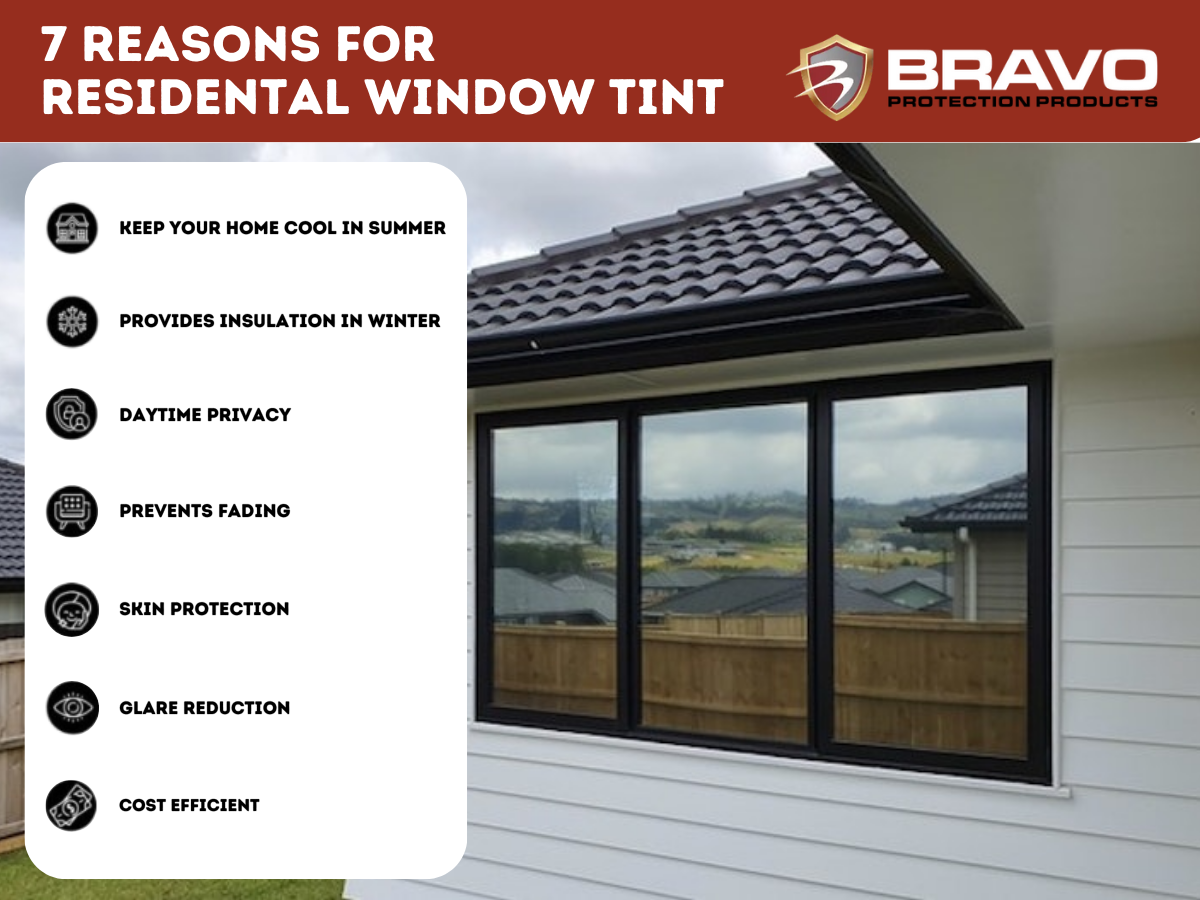Residential Window Tint: Keep Your Home Comfy Year-Round
Residential Window Tint: Keep Your Home Comfy Year-Round
Blog Article
How Residential Home Window Tinting Boosts Your Home's Energy Efficiency
Residential home window tinting offers a compelling solution for house owners looking for to improve energy effectiveness within their living rooms. By using specialized movies to windows, it efficiently reduces warm transfer, thereby supporting indoor temperatures and minimizing the requirement for too much home heating or air conditioning.
Comprehending Home Window Tinting
Understanding window tinting is vital for property owners seeking to improve both convenience and power efficiency in their space. Residential Window Tint. Home window tinting involves the application of a slim film to the interior or exterior surface of glass windows. This movie can significantly regulate the amount of sunlight and warm that enters a home, thus influencing indoor climate conditions
There are various kinds of window tinting movies offered, each with distinctive residential properties. Dyed films soak up solar power, while reflective movies disperse it away from the glass surface area. Ceramic movies provide a balance of presence and warmth being rejected, making them a prominent choice amongst home owners. The efficiency of window tinting is frequently measured by its Visible Light Transmission (VLT) percent, which suggests just how much light can pass with the film.
Advantages of Power Effectiveness
Home window tinting not only boosts visual appeals yet likewise plays a significant duty in improving power efficiency within residential rooms. By decreasing warmth transfer via home windows, tinted movies develop an extra stable indoor environment, which can lead to substantial reductions in energy consumption for cooling and heating. This power effectiveness translates right into reduced utility expenses, giving homeowners with considerable long-lasting savings.

In addition, window tinting enhances the convenience of living rooms. By decreasing glare and obstructing harmful UV rays, colored windows develop an even more pleasant setting, which can bring about improved well-being for passengers. The protection against UV rays also assists preserve furnishings and floor covering from fading, adding to the long life of house items.
How Tinting Functions
Tinting movies operate with a combination of innovative materials and technologies created to control the quantity of solar energy entering a home. Primarily made up of polyester, these movies commonly incorporate ceramic or metallic bits that absorb and show heat. This double capacity permits them to dramatically minimize the infiltration of ultraviolet (UV) rays and infrared radiation while permitting visible light to pass through.
The efficiency of home window tinting is determined by its solar warm gain coefficient (SHGC), which shows just how much solar energy is transferred through the window. you can try this out Reduced SHGC worths are better as they signify better warm denial. Furthermore, home window tints can feature a selection of shades, enabling house owners to personalize their aesthetic preferences while boosting power effectiveness.
Additionally, these films work as a barrier, avoiding warm loss during cooler months by mirroring indoor warmth back right into the space. This thermal insulation result enhances the cooling advantages obtained throughout warmer months, adding to a well balanced indoor climate year-round. By managing solar energy properly, residential window tinting not only enhances convenience but also plays a crucial click here to find out more function in minimizing energy intake and decreasing energy costs.
Selecting the Right Tint

There are numerous types of window movies offered, consisting of colored, metalized, and ceramic. Colored movies are affordable but might have restricted sturdiness. Metalized movies supply far better heat denial yet can hinder digital signals. Ceramic films give excellent heat control without compromising exposure and are highly resilient, go making them a preferred option.
Visible light transmission (VLT) is another essential factor, as it indicates the amount of all-natural light that can go through the colored glass. Homeowners need to pick a color with a VLT that complements their illumination preferences while still offering appropriate glow decrease.
Additionally, assessing the solar warmth gain coefficient (SHGC) can assist identify how well a color can block warm from sunshine. A lower SHGC shows much better heat control, ultimately improving energy performance.
Installation and Maintenance Tips
Correct installation and upkeep are important parts in maximizing the advantages of household window tinting. Experts additionally make use of specialized strategies and devices, which can boost the sturdiness and performance of the color.
Following setup, upkeep is important to extend the life of the window film. It is advised to wait at the very least 30 days before cleansing the colored home windows to enable the adhesive to heal fully.
Additionally, routine examinations are advantageous. Inspect for any kind of peeling or bubbling, which can indicate improper installment or put on over time - Residential Window Tint. Attending to these concerns promptly can protect against additional damage and maintain energy performance. By sticking to these installment and maintenance ideas, homeowners can ensure their home window tinting continues to supply significant power savings and comfort for many years ahead.
Conclusion
In final thought, residential home window tinting serves as an effective remedy for improving energy effectiveness within homes. By reducing warm transfer and obstructing damaging UV rays, home window movies add to lower energy consumption and boosted indoor comfort.
Window tinting entails the application of a slim movie to the interior or exterior surface of glass home windows. By lowering heat transfer through windows, colored films develop a more secure indoor climate, which can lead to significant decreases in power consumption for heating and cooling.The efficiency of home window tinting is determined by its solar warm gain coefficient (SHGC), which indicates just how much solar power is transferred via the window. By managing solar energy effectively, household window tinting not only enhances comfort yet also plays a vital role in minimizing energy usage and reducing energy expenses.
By minimizing warm transfer and blocking dangerous UV rays, home window films add to lower energy consumption and improved interior comfort.
Report this page